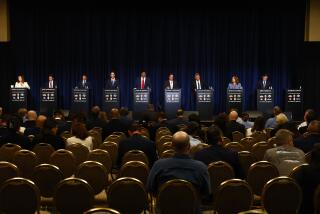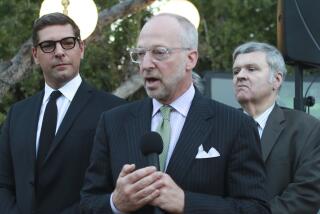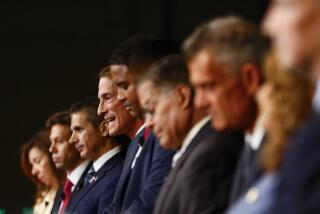Rampart Effects Spill Into Politics
- Share via
Anyone parachuting into Los Angeles recently might have deduced that Dist. Atty. Gil Garcetti is up against a tough, well-connected opponent as he heads into a November runoff for reelection.
But Police Chief Bernard C. Parks is not running against Garcetti, appearances to the contrary. Garcetti’s actual challenger, Deputy Dist. Atty. Steve Cooley, has mostly watched from the sidelines as Garcetti and Parks have slugged it out over the prosecutor’s complaint that the police chief withheld evidence from deputy district attorneys looking into the Rampart scandal.
Politically speaking, it’s not clear who, if anyone, has gained from the exchange between Parks and Garcetti.
What does seem clear is that it has changed the dynamics of a race in which Garcetti is struggling to win a third term.
The incumbent finished a close second in the three-way March 7 primary, forcing him into the runoff with Cooley, a veteran prosecutor whose contempt for Garcetti runs deep. Cooley has insisted all along that the Rampart scandal, involving widespread abuses in a police anti-gang unit, would be the top issue in the race, while the district attorney has tried to keep the focus on other matters.
Now Rampart has clearly taken center stage, with Garcetti and Parks the main players. The chief has accused Garcetti of going too slowly in prosecuting rogue officers, while Garcetti has accused Parks of obstructing his investigators. The fight lost some of its fury late last week, when the Police Commission ordered Parks to cooperate with the district attorney.
Garcetti has said the feud “has nothing to do with politics. I don’t know how much this hurts me [or] helps me. It doesn’t make any difference.”
Others see it purely in terms of politics. But there is little agreement about what difference it makes.
“This whole thing could be an opportunity,” said political consultant Steven Afriat, assessing the impact on Garcetti’s campaign. “Or it could be the final nail in his coffin.”
Had Garcetti been more popular in the first place, voters might have rallied around him, given the nearly universal feeling among other legal authorities that Parks had overstepped his bounds in the dispute with the district attorney, Afriat said. But only 37% of the electorate supported Garcetti in the primary.
“I think that when you are as weakened as he is as a candidate, you don’t want to be embattled with anybody,” Afriat said. “But in light of how poorly the Rampart scandal reflects on Parks, I don’t think it’s hurting [Garcetti] that much.” Parks, he said, “is not the right messenger.”
Afriat and others noted that the November election is still eons away in the compressed time frame of politics. If Garcetti waits until early fall to begin seeking indictments in the Rampart scandal, his battles in March could well be forgotten. And no trials would be likely to begin--and, possibly, be lost--until after the election.
In any likely scenario, though, Rampart “is going to loom large,” Assembly Speaker Antonio Villaraigosa, a mayoral candidate, said in an interview. Villaraigosa endorsed Garcetti last year, but he paused for a long time when asked if he thought the district attorney had done a good job in his handling of the Rampart scandal and the dispute with Parks.
“I don’t want to . . . “ he began, and trailed off. “Well, I think . . . “ Pausing again, he finally said, “I think there are many questions about how this matter has been handled that will be resolved in that campaign.”
One major figure in the dispute is Mayor Richard Riordan, who raised the stakes late last week when he suggested that he was withholding an endorsement of Garcetti while he waited to see if the prosecutor and the police chief could patch up their differences.
“I had indicated at one time I would support the present district attorney,” Riordan said in an interview on the KCRW radio program “Which Way, L.A.?” “But right now, I’m going to step back, I’m going to see if these two guys can work together and get Rampart behind us.”
Most political observers agree that Riordan is using his endorsement as a carrot to entice Garcetti to lay off Parks, to whom the mayor remains loyal. Fernando Guerra, director of the Center for the Study of Los Angeles at Loyola Marymount University, said Riordan may also have enhanced the value of his endorsement by making it appear tougher to get.
For the time being, though, the mayor may have damaged Garcetti politically by declaring that the prosecutor and Parks were behaving like children, and by placing the heavier share of the blame on Garcetti.
“Why did the D.A. act the way he did?” Riordan asked in the radio interview. “It didn’t make any political sense, let alone substantive sense.”
Guerra, for one, disagreed, saying that he thought Garcetti displayed eminently good sense politically and administratively. “I actually think it’s an advantage to Garcetti,” he said.
Guerra noted that the City Council, the state attorney general, the city attorney and the mayor all demanded that Parks order the Police Department to cooperate with Garcetti.
“That’s a pretty overwhelming response,” Guerra said. “He can almost spin it as an endorsement of his candidacy.”
At the same time, Guerra said, Cooley reacted sensibly by generally steering clear of this particular fray. Had he tried to exploit it politically, he would have risked appearing opportunistic, Guerra said.
Cooley’s main response was to issue a statement saying the dispute was “very troubling” and might have been avoided had Garcetti acted earlier to investigate and prosecute Rampart officers.
“At the moment, Gil’s got the ball and he’s running for the wrong end zone,” said Cooley campaign advisor John Shallman. “So we’re just going to stand on the sidelines and watch him score for our side.”
By Guerra’s reckoning, everyone in this high-tension civic drama acted as he might have been expected to act--indeed, as he should have acted. And that may be the problem.
“Individually, they did it well,” he said, “but collectively it didn’t play out well to the mass public.”
More to Read
Sign up for Essential California
The most important California stories and recommendations in your inbox every morning.
You may occasionally receive promotional content from the Los Angeles Times.










